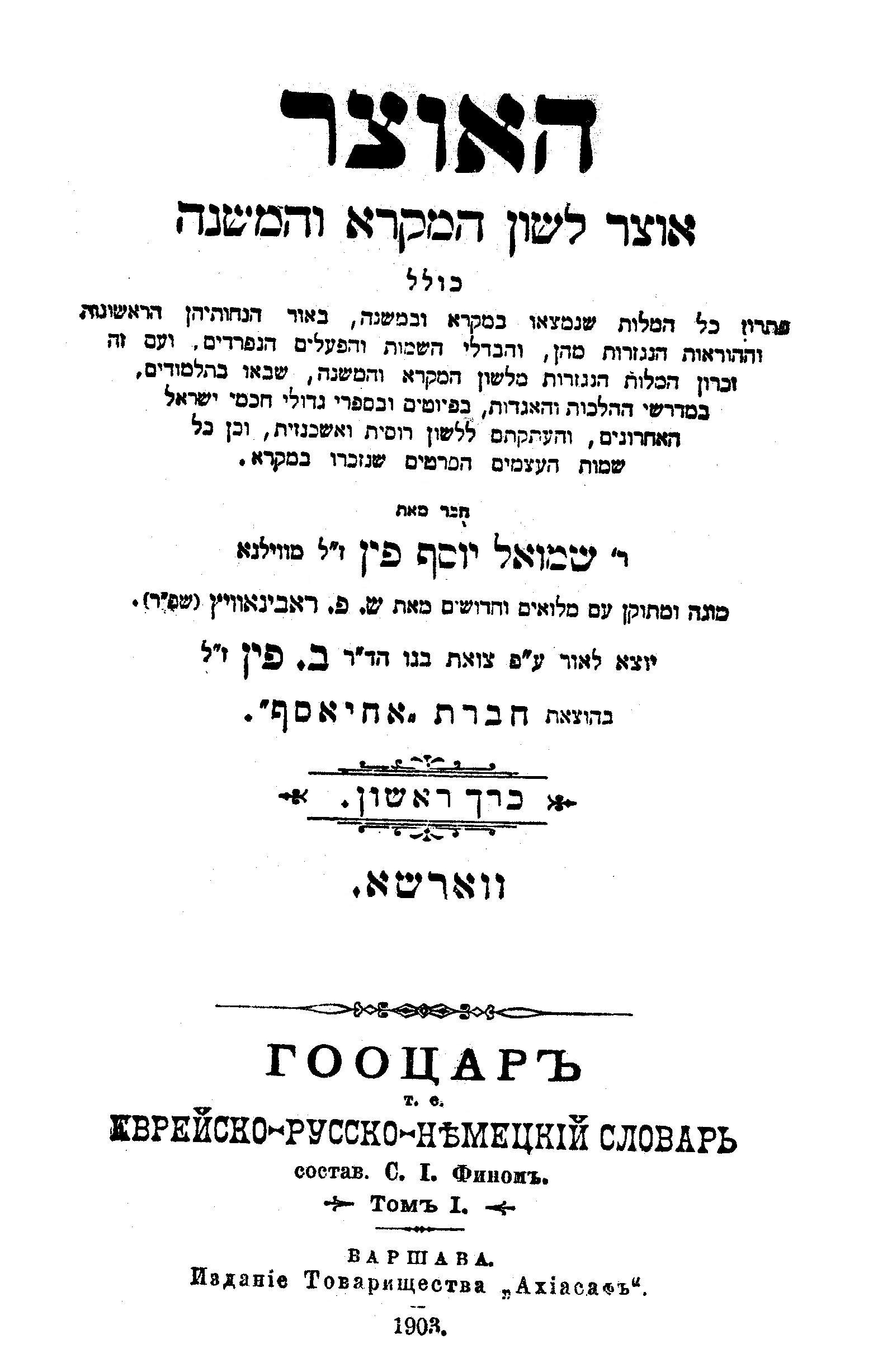|
Rabbi David Solomon EybeschÞtz
Harav (Rabbi) David Solomon Eibeschutz () (alternate English spelling: David Shlomo Eibeschitz; Russian version: Ivshitz) was an 18th century rabbi, Kabbalist and author. He was born in 1755 to a simple family most likely in the village of Jezierzany (Ukrainian: Ozeriany,ÐзÐĩŅŅÐ―Ðļ)in Ternopil Oblast, Ukraine (in Poland until 1939.) There is some doubt as to his birthplace. There is an Ozeriany, Borshchiv Raion зÐĩŅŅÐ―Ðļ(ÐÐūŅŅŅÐēŅŅКÐļÐđ ŅаÐđÐūÐ―) and Ozeriany, Buchach Raion зÐĩŅŅÐ―Ðļ(ÐŅŅаŅŅКÐļÐđ ŅаÐđÐūÐ―)and both are in Ternopil Oblast, Ukraine; it is unclear which of the two villages were his birthplace. Nonetheless, the areaâs acceptance of Jews was tentative. From 1717 to 1764, during the period when Rabbi Dovid Shlomo was born, a unit of infantry would be positioned in the town in the winter months; it was assumed that the fear of pogroms deterred Jews from settling in the town itself. Biography Rabbi Dovid Shlomoâs father was a Russian ra ... [...More Info...] [...Related Items...] OR: [Wikipedia] [Google] [Baidu] |
Samuel Joseph Fuenn
Samuel Joseph Fuenn (; 15 October 1818 â 11 January 1891), also known as Rashi Fuenn () and Rashif (), was a Lithuanian Hebrew writer, scholar, printer, and editor. He was a leading figure of the eastern European Haskalah, and an early member of áļĪovevei Zion. Biography Fuenn was born in Vilna, Russian Empire, the son of merchant and Torah scholar YitsáļĨak Aizik Fuenn of Grodno. Though he received a traditional religious education until the age of 17, he also acquired an extensive general knowledge of German literature and other secular subjects, and became proficient in Russian, French, Latin, Polish, and English. He afterwards joined Vilna's circle of young '' maskilim''. In 1848 the government appointed him teacher of Hebrew and Jewish history in the newly founded rabbinical school of Vilna. Fuenn filled this position with great distinction till 1856, when he resigned. The government then appointed him superintendent of the Jewish public schools in the district of Vil ... [...More Info...] [...Related Items...] OR: [Wikipedia] [Google] [Baidu] |
Benjacob
Isaac ben Jacob Benjacob (10 January 1801, Ramygala â 2 July 1863, Vilnius) was a Lithuanian Jewish maskil, best known as a bibliographer, author, and publisher. His 17-volume Hebrew Bible included Rashi, Moses Mendelssohn, as well as his own ''Mikraei Kodesh'', which "emended" the biblical text and helped spread the Haskalah movement. Biography and works Before he learned Russian, his parents moved to Vilnius, "and there he received instruction in Hebrew grammar and rabbinical lore".Pending further edits, "Biography and works" is a rewrite of AND THE SINGLE SOURCE for the rest of this Wiki article. Benjacob began to write early and composed short poems and epigrams in pure Biblical Hebrew that are among the best of their kind in Neo-Hebraic literature. For several years he lived in Riga, where he was engaged in business, but always studying and writing in his leisure hours. Later he became a publisher and bookseller and went to Leipzig, where he published his first work, '' ... [...More Info...] [...Related Items...] OR: [Wikipedia] [Google] [Baidu] |
1755 Births
Events January–March * January 23 (O. S. January 12, Tatiana Day, nowadays celebrated on January 25) – Moscow University is established. * February 13 – Treaty of Giyanti: The kingdom of Mataram on Java is divided in two, creating the sultanate of Yogyakarta and the sunanate of Surakarta. * March 12 – A steam engine is used in the American colonies for the first time as New Jersey copper mine owner Arent Schuyler installs a Newcomen atmospheric engine to pump water out of a mineshaft. * March 22 – Britain's House of Commons votes in favor of ÂĢ1,000,000 of appropriations to expand the British Army and Royal Navy operations in North America. * March 26 – General Edward Braddock and 1,600 British sailors and soldiers arrive at Alexandria, Virginia on transport ships that have sailed up the Potomac River. Braddock, sent to take command of the British forces against the French in North America, commandeers taverns and private homes t ... [...More Info...] [...Related Items...] OR: [Wikipedia] [Google] [Baidu] |
1813 Deaths
Events January–March * January 5 – The Danish state bankruptcy of 1813 occurs. * January 18âJanuary 23, 23 – War of 1812: The Battle of Frenchtown is fought in modern-day Monroe, Michigan between the United States and a British and Native American alliance. * January 24 – The Philharmonic Society (later the Royal Philharmonic Society) is founded in London. * January 28 – Jane Austen's ''Pride and Prejudice'' is published anonymously in London. * January 31 – The Assembly of the Year XIII is inaugurated in Buenos Aires. * February – War of 1812 in North America: General William Henry Harrison sends out an expedition to burn the British vessels at Fort Malden by going across Lake Erie via the Bass Islands in sleighs, but the ice is not hard enough, and the expedition returns. * February 3 – Argentine War of Independence: JosÃĐ de San MartÃn and his Regiment of Mounted Grenadiers gain a largely symbolic victory against a R ... [...More Info...] [...Related Items...] OR: [Wikipedia] [Google] [Baidu] |
19th-century Rabbis From The Russian Empire
The 19th century began on 1 January 1801 (represented by the Roman numerals MDCCCI), and ended on 31 December 1900 (MCM). It was the 9th century of the 2nd millennium. It was characterized by vast social upheaval. Slavery was Abolitionism, abolished in much of Europe and the Americas. The First Industrial Revolution, though it began in the late 18th century, expanded beyond its British homeland for the first time during the 19th century, particularly remaking the economies and societies of the Low Countries, France, the Rhineland, Northern Italy, and the Northeastern United States. A few decades later, the Second Industrial Revolution led to ever more massive urbanization and much higher levels of productivity, profit, and prosperity, a pattern that continued into the 20th century. The Catholic Church, in response to the growing influence and power of modernism, secularism and materialism, formed the First Vatican Council in the late 19th century to deal with such problems an ... [...More Info...] [...Related Items...] OR: [Wikipedia] [Google] [Baidu] |
18th-century PolishâLithuanian Rabbis
The 18th century lasted from 1 January 1701 (represented by the Roman numerals MDCCI) to 31 December 1800 (MDCCC). During the 18th century, elements of Enlightenment thinking culminated in the Atlantic Revolutions. Revolutions began to challenge the legitimacy of monarchical and aristocratic power structures. The Industrial Revolution began mid-century, leading to radical changes in human society and the environment. The European colonization of the Americas and other parts of the world intensified and associated mass migrations of people grew in size as part of the Age of Sail. During the century, slave trading expanded across the shores of the Atlantic Ocean, while declining in Russia and China. Western historians have occasionally defined the 18th century otherwise for the purposes of their work. For example, the "short" 18th century may be defined as 1715â1789, denoting the period of time between the death of Louis XIV of France and the start of the French Revolution, ... [...More Info...] [...Related Items...] OR: [Wikipedia] [Google] [Baidu] |
Rabbis In Ottoman Galilee
A rabbi (; ) is a spiritual leader or religious teacher in Judaism. One becomes a rabbi by being ordained by another rabbiâknown as ''semikha''âfollowing a course of study of Jewish history and texts such as the Talmud. The basic form of the rabbi developed in the Pharisaic (167 BCEâ73 CE) and Talmudic (70â640 CE) eras, when learned teachers assembled to codify Judaism's written and oral laws. The title "rabbi" was first used in the first century CE. In more recent centuries, the duties of a rabbi became increasingly influenced by the duties of the Protestant Christian minister, hence the title "pulpit rabbis." Further, in 19th-century Germany and the United States, rabbinic activities such as sermons, pastoral counseling, and representing the community to the outside all increased in importance. Within the various Jewish denominations, there are different requirements for rabbinic ordination and differences in opinion regarding who is recognized as a rabbi. Non-Orthod ... [...More Info...] [...Related Items...] OR: [Wikipedia] [Google] [Baidu] |
Bessarabian Jews
The history of the Jews in Bessarabia, a historical region in Eastern Europe, dates back hundreds of years. Early history Jews are mentioned from very early on in the Principality of Moldavia, but they did not represent a significant number. Their main activity in Moldavia was commerce, but they could not compete with Greeks and Armenians, who had knowledge of Levantine commerce and relationships. Several times, when Jewish merchants created monopolies in some places in north Moldavia, Moldavian rulers sent them back to Galicia (eastern Europe), Galicia and Podolia. One such example was during the reign of Petru Čchiopul (1583â1591), who favored the English merchants led by William Harborne.Ion Nistor, ''Istoria Basarabiei'', CernÄuČi, 1923, reprinted ChiČinÄu, Cartea MoldoveneascÄ, 1991, pp. 201-02 In the 18th century, more Jews started to settle in Moldavia. Some of them were in charge of the Dniester crossings, replacing Moldavians and Greeks, until the captain of So ... [...More Info...] [...Related Items...] OR: [Wikipedia] [Google] [Baidu] |
Rabbis In Safed
A rabbi (; ) is a spiritual leader or religious teacher in Judaism. One becomes a rabbi by being ordained by another rabbiâknown as ''semikha''âfollowing a course of study of Jewish history and texts such as the Talmud. The basic form of the rabbi developed in the Pharisees, Pharisaic (167 BCEâ73 CE) and Talmudic (70â640 CE) eras, when learned teachers assembled to codify Judaism's written and oral laws. The title "rabbi" was first used in the first century CE. In more recent centuries, the duties of a rabbi became increasingly influenced by the duties of the Clergy, Protestant Christian minister, hence the title "pulpit rabbis." Further, in 19th-century Germany and the United States, rabbinic activities such as sermons, pastoral counseling, and representing the community to the outside all increased in importance. Within the various Jewish denominations, there are different requirements for rabbinic ordination and differences in opinion regarding who is recognized as a ... [...More Info...] [...Related Items...] OR: [Wikipedia] [Google] [Baidu] |
Hasidic Rebbes
Hasidism () or Hasidic Judaism is a religious movement within Judaism that arose in the 18th century as a spiritual revival movement in contemporary Western Ukraine before spreading rapidly throughout Eastern Europe. Today, most of those affiliated with the movement, known as ''hassidim'', reside in Israel and in the United States (mostly Brooklyn and the Hudson Valley). Israel Ben Eliezer, the "Baal Shem Tov", is regarded as its founding father, and his disciples developed and disseminated it. Present-day Hasidism is a sub-group within Haredi Judaism and is noted for its religious conservatism and social seclusion. Its members aim to adhere closely both to Orthodox Jewish practice â with the movement's own unique emphases â and the prewar lifestyle of Eastern European Jews. Many elements of the latter, including various special styles of dress and the use of the Yiddish language, are nowadays associated almost exclusively with Hasidism. Hasidic thought draws heavily on ... [...More Info...] [...Related Items...] OR: [Wikipedia] [Google] [Baidu] |






